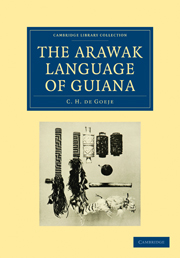Book contents
- Frontmatter
- Preface
- Contents
- List of literature
- Rules for pronunciation and abbreviations
- Alphabetical Index
- German words in Schultz' texts
- CHAPTER I Finite verb
- CHAPTER II Character of the Arawak words
- CHAPTER III Infinite verb
- CHAPTER IV Auxiliary verb a
- CHAPTER V Intensives, conjunctions, etc.
- CHAPTER VI K; B
- CHAPTER VII F; P; B
- CHAPTER VIII M
- CHAPTER IX N
- CHAPTER X D
- CHAPTER XI T
- CHAPTER XII Formation of verbs, etc.
- CHAPTER XIII L; R
- CHAPTER XIV H
- CHAPTER XV S
- CHAPTER XVI Vowels, diphotongs; colours
- CHAPTER XVII Classes of utterances; numerals
- CHAPTER XVIII Man
- CHAPTER XIX Foreign words. Arawak and Arawak-Maipure
- CHAPTER XX Origins of the Arawak language
- APPENDIX: Information collected in Surinam in 1907 and in 1928
- Frontmatter
- Preface
- Contents
- List of literature
- Rules for pronunciation and abbreviations
- Alphabetical Index
- German words in Schultz' texts
- CHAPTER I Finite verb
- CHAPTER II Character of the Arawak words
- CHAPTER III Infinite verb
- CHAPTER IV Auxiliary verb a
- CHAPTER V Intensives, conjunctions, etc.
- CHAPTER VI K; B
- CHAPTER VII F; P; B
- CHAPTER VIII M
- CHAPTER IX N
- CHAPTER X D
- CHAPTER XI T
- CHAPTER XII Formation of verbs, etc.
- CHAPTER XIII L; R
- CHAPTER XIV H
- CHAPTER XV S
- CHAPTER XVI Vowels, diphotongs; colours
- CHAPTER XVII Classes of utterances; numerals
- CHAPTER XVIII Man
- CHAPTER XIX Foreign words. Arawak and Arawak-Maipure
- CHAPTER XX Origins of the Arawak language
- APPENDIX: Information collected in Surinam in 1907 and in 1928
Summary
L in Arawak generally indicates the principle of “loose”, “willing (and able) to move”, whilst r on the contrary indicates the principle of “fixed”, “unable to move”, “motion being impeded”.
G. Arawak has an l, an r, and two intermediate consonants; for the consonant most closely resembling l, the sign λ is used; for the consonant most closely resembling r, the sign ϱ is used. It is possible that on further examination no real difference will be found between λ and ϱ.
L and r are used in places where the difference is of importance, for instance -loko, in (free), -roko, in (bound), kalime, shining, karime, black. It is, however, not clear, why they say pero, dog, and kaϱina. fowl, báϱa, sea.
In a few cases a word in a vocabulary contains an l where an r might be expected, and vice versa; presumably these are simple mistakes resulting from indistinct pronunciation.
Te added to a verbal form, denotes “limited motion”: t motion towards an object, e slowing down.
Li added to a verbal form, denotes “freely flowing forth”; l loose, i principle or quick).
Examples, with ausa, to go, or really “to form a void” (§ 130 b)).
a) ma-heragi-n bena na-muni kwawa ie, n-ausa kiana, and when they agreed not among themselves, they departed, h-ausa ho-kona mairia-tu isikwa-hu mun i-ro, go into the village over against you.
- Type
- Chapter
- Information
- The Arawak Language of Guiana , pp. 135 - 147Publisher: Cambridge University PressPrint publication year: 2009First published in: 1928



